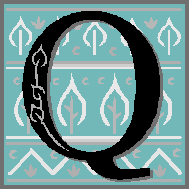
Do you have a regular routine that signals it's time to be creative?
 It might seem like having a writing routine and regular habits would stifle creative inspiration. But I think there is merit to setting up a routine, so that the creative mind recognizes it is time to write. It could be triggered by writing in the same place each day or at the same time. Gregory Ciotti (who uses his technical devices to signal writing vs research or reading) explains the concept in depth in his article about changing habits, "The Best Way to Change Your Habits? Control Your Environment," which is well-researched and worth the read. Do you have a regular routine that signals it's time to be creative?  I love inspiring quotations. Someone else's words are often just what you need to motivate you. Here are a few of my favorites: “Don't tell me the moon is shining; show me the glint of light on broken glass.” --Anton Chekhov “There is nothing to writing. All you do is sit down at a typewriter and bleed.” ---Ernest Hemingway “You can't wait for inspiration. You have to go after it with a club.” --Jack London (Thanks to Lady Jai for sharing this one.) “There is no greater agony than bearing an untold story inside you.” --Maya Angelou “You gain strength, courage and confidence by every experience in which you really stop to look fear in the face. . . . You must do the thing you think you cannot do.” --Eleanor Roosevelt Please share your own favorite inspirational quotes in the comments.
 With 26 blog posts from A to Z, I hope you’ll forgive one dedicated to my debut novel, Pandemic, which will be officially released on May 6. (FYI--a Goodreads giveaway of ten hard cover copies is going on right now.) I had many sources of inspiration for Pandemic, including:
An anecdote: At one point during the Swine Flu (H1N1) pandemic in 2009, the vaccine became available in my suburban town. Public health officers organized its free distribution at the local middle school after school hours. They may have only been vaccinating the children, if I remember correctly, and not the parents. The line extended for blocks. I waited with a mom who had a son the same age as mine. The boys ran off to play nearby while we chatted and at first, it was a relatively pleasant afternoon. But at some point, the people running the process announced that they didn't have enough vaccine for all of the children waiting. Kids with asthma (or other health conditions that would make the flu more dangerous) were to be vaccinated first, and the remaining families at the back end of the line was informed that since there wasn’t enough, they should go home. Well. Hell hath no fury like a woman protecting her young. The whole mood of the crowd changed. I had gotten there absurdly early (if you know me, you're not at all surprised by this) and we were within the cutoff to receive the vaccine. I watched as unhappy moms verbally accosted the public health officials who stood outside, trying to keep order. I thought there might be a riot. And--keep in mind--the swine flu, although highly contagious, was not ultimately any more deadly than regular seasonal influenza. Later on, I couldn’t help thinking. What if? What if it was highly contagious and lethal? How would people act then? The fear and the emotion would be that much higher. What struggles would people face to survive? There are no lines of people waiting for the vaccine in Pandemic; it’s too early in the disease timeline to have one available. But that afternoon was certainly a significant inspiration. What was the main source of inspiration for your current creative project?  ISBN13: 978-1-62873-609-0 ISBN13: 978-1-62873-609-0 For more information about Pandemic, visit the Books page of my website. Kirkus Reviews: “In her first novel, Ventresca pulls together three unrelated themes to create a medical thriller/romance. . . . this realistic page-turner will keep most readers enthralled.” School Library Journal: “This is an engrossing apocalyptic story….Themes of friendship and coming together in a crisis carry the novel.”  The letter O is for one-star reviews. You may not consider one-star reviews inspiring. In fact, you probably think of them as a source of creative derailment. But not these! Travis Jonker has a created a series of "guess the one-star review" posts at 100 Scope Notes that will help put reviews of your own work into perspective. Thank you to Kate Messner for introducing this to SCBWI NYC Conference attendees during her speech on failure. Click here for the list, currently up to its 18th review for your guessing pleasure. Number 15 made me laugh out loud. How do you handle (or plan to handle) unfavorable reviews?  N is for Napping! Naps are a luxury, but can they actually improve creativity? Researchers studied brain activity during power naps, and found that the right (creativity-associated) side of the brain is surprisingly active during these periods. Another study suggests that dreaming can make you more creative. I might be making excuses for my sleep patterns, but if it worked for Thomas Edison, it can work for me. How about you? Are you pro-nap? Characters on the autism spectrumBefore I get to the letter of the day: Since April is Autism Awareness Month, I was able to contribute a guest post to YA Highway about autistic characters in teen literature. You can access it here: Characters on the Autism Spectrum. Feel free to comment there instead of on today's post if you wish. M is for the mundane... Inspiration can often come from the mundane. If you are creatively stuck, do something boring. Take a shower. Drive on an errand. Go for a walk or a run. Taking a break from your writing and doing something mindless can be a huge boost. I can’t explain the science behind it, but almost everyone has had the experience of solving a problem when they were folding the laundry or brushing their teeth. It just happens. I joked with my critique group that during the writing of Pandemic, I went out for a run and came back with a baby. During my jog, I started to think about my main character, Lil, as I listened to neighborhood noises. As an infant cried from a nearby home, a new character was born, someone who would further complicate Lil's attempts to survive the deadly outbreak. So step away from the computer and get your everyday chores done. You can cross some items off your to-do list and you might even become creatively inspired. By Yvonne Ventresca  So many inspiring lectures are accessible online. If you have about five minutes: Joe Sabia: The technology of storytelling (Quick and interesting) If you have about twenty minutes: JK Rowling: The fringe benefits of failure (For Harry Potter fans) OR Steven Johnson: Where good ideas come from (More innovation-related than story-creating, but still interesting. Maybe we should brainstorm our novels together in a coffee shop?) If you have over an hour and a box of tissues: Randy Pausch: Really Achieving Your Childhood Dreams (Wow.) Are there any inspirational videos you'd like to recommend?  Stephen King's On Writing is one of my favorite writing books. It combines memoir with craft advice in a practical, no-nonsense style. From the spike in his bedroom wall for rejection letters when he was fourteen, to his wife taking the Carrie manuscript from his garbage can, King shares his creative struggles. Each time I read this book, I take something new away from it.  Cover from Goodreads Cover from Goodreads Some favorite quotes: On what he learned from writing Carrie: ". . . stopping a piece of work just because it's hard, either emotionally or imaginatively, is a bad idea." (Page 69) About secondary characters: ". . . no one is 'the bad guy' or 'the best friend' or 'the whore with a heart of gold' in real life; in real life we each of us regard ourselves as the main character. . . ." (Page 189) On his love of books and reading: "If I have to spend time in purgatory before going to one place or the other, I guess I'll be all right as long as there's a lending library. . . ." (page 96) If you've read On Writing, did you find it helpful? Do you have a favorite Stephen King novel?  Jealousy may not feel like a particularly inspiring emotion. But I think it can be used as a source of motivation. If I'm jealous that a friend is an accomplished musician, I might want to stop and ask myself: why do I care? Am I unhappy in my own creative pursuits? Am I practicing my craft in the same way that she did in order to achieve success? What am I lacking and what can I do about it? Psychology Today published an article about overcoming jealousy. And there's an interesting post about Four Ways to Use Jealousy for Growth and Personal Gain which begins with this quote from Joan Didion: Have you ever found jealousy or envy to be motivational? For Gin Blossom fans, a great article about the band and this song.
 Since my A to Z theme is creative inspiration, the letter "I" just had to be for Inspiration Sandwich by SARK (Susan Ariel Rainbow Kennedy). This is a whimsical book filled with colorful doodles and hand-written pages meant to inspire.  Cover from Goodreads Cover from Goodreads Excerpt from the official description: a "collection of 43 ways to awaken your creative self, including 'invite someone dangerous to tea,' 'take lots of naps,' and 'make friends with freedom and uncertainty.'" Have you read any of SARK's books, or other books that are visually inspiring? |
JOIN NOW!
Sign up for Yvonne's newsletter for exclusive content, book news, and other occasional author goodies. Archives
June 2025
Categories
All
|